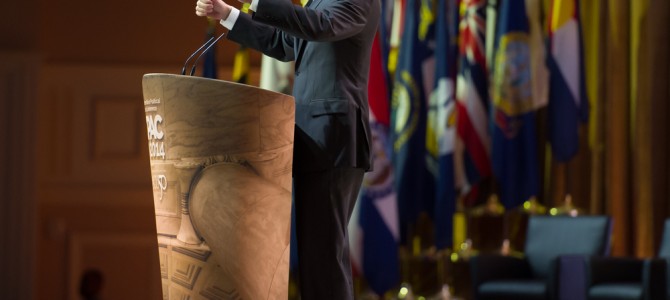
For the last two weeks, Washington DC’s favorite parlor game has been wondering if—or when—House Ways and Means Committee chairman Rep. Paul Ryan will succumb to the many calls for him to serve as the next Speaker of the House. Just ask Twitter.
While no member of the House could achieve unanimous support, Ryan’s conservative bona fides make him an appealing, if not dream, candidate for those hoping someone to lead the fractious GOP caucus.
But while a Speaker Ryan could be a short-term fix to a House majority divided into factions, it would also be a waste. A waste of a bright political future, to be sure, but also a waste of someone who has been a prime example of what conservative principles brought to legislating should look like.
When he was chairman of the Budget Committee, Ryan led a serious, multi-year effort into understanding the flaws of our nation’s social safety-net. His approach and prescription were an attempt to make government responsive to the needs of the millions of Americans struggling to make ends meet.
The GOP needs Ryan right where he is. So do people living in poverty.
Fighting Poverty, Not Perpetuating It
There’s no question that our nation’s approach to fighting poverty has serious flaws. Needy families and individuals lack the economic and social supports necessary to achieve a better future. The nearly $800 billion the federal government spends on this each year not only leaves too many in poverty (46.7 million at last count), but too often weakens the very institutions of family and community that could help uplift those in need.
To many on the Left, the answer is more—more housing, more nutrition assistance, more unemployment benefits—and for too long, the conservative response has been to say no to increased spending without offering an alternative.
Ryan took a deep dive into the perverse incentives and outdated approaches that characterize much of our nation’s approach to fighting poverty, bringing in some of the leading thinkers in the reform conservatism movement to help develop his thinking—and going out into the streets to meet with those in poverty.
The result was a 73-page discussion draft that was a serious proposal to reform our nation’s welfare system. It was an example of what reform could look like if taken from the pages of National Affairs: a thoughtful conservative attempt to improve the workings of government, not just “starve the beast” or treat it as a necessary evil.
When introducing his plan, Ryan said the federal government should be “the rearguard—it protects the supply lines. But the people on the ground—they’re the vanguard. They fight poverty on the front lines. They have to lead this effort, and Washington should follow their lead.” Enabling this sort of locally-based, holistic approach to fighting poverty should be a priority for the GOP conference.
Ryan Can Work Across the Aisle
Conservatives should be intimately familiar with the specifics of anti-poverty policy, not just passively content with a status quo that leaves too many in broken homes and crumbling communities. The two-step poverty-fighting plan of getting married and finding a good job works poorly when there are few jobs and fewer role models of what a successful marriage looks like. Ryan’s plan understands that reality and works to address it.
Additionally, Ryan has worked across the aisle, most notably with Sen. Patty Murray (D-Washington) during the fiscal cliff crises, but also with Murray on introducing a bill whose sole purpose is to increase the availability and accessibility of research into the effectiveness of government programs. Evidence-based policymaking should be a hallmark of conservative leadership, yet it would not take long for his history of bipartisan efforts to become a liability at the first sign of unrest (just ask John Boehner).
Ryan’s detailed work isn’t a sop to policy wonks but a well-intentioned example of sound governance—to determine what works and support those efforts, while refining or shuttering the ones that don’t. It’s an example of domestic policy leadership that seeks to truly serve the people. It’s sound politics and even better practice.
The GOP Needs a Public Policy Entrepreneur
In the role of Speaker, Ryan’s plate would be filled with the nuts and bolts of leading a divided party and trying to keep the operations of governance running. He might attempt to work on the margins to incorporate elements of reform, but would likely find himself bogged down trying to balance competing interests in a thankless job.
Sure, others could take up the mantle Ryan would leave behind. But relatively few lawmakers have shown the willingness to delve into policy specifics and improve the effectiveness of government programs to the same degree.
The GOP needs Ryan where he is, to serve as a policy innovator and example of conservative principles applied to public policy. It needs to show the American people it has leaders who are serious about not just slashing government spending, but ensuring that what the federal government spends it does so efficiently and effectively. Taxpayers and those who receive government assistance deserve nothing less.
Would Ryan be a good Speaker? It’s certainly possible. But as a committee chairman, he can keep his focus on these deep-seated problems, actively restructure our nation’s safety-net efforts, and continue to bear the standard of smart, evidence-based conservative governance. And he can do all that while keeping open the option of a run for the White House in four or eight years.
An earlier version of this piece inadvertently transposed Chairman Ryan’s current and past committees. The author regrets the error.









